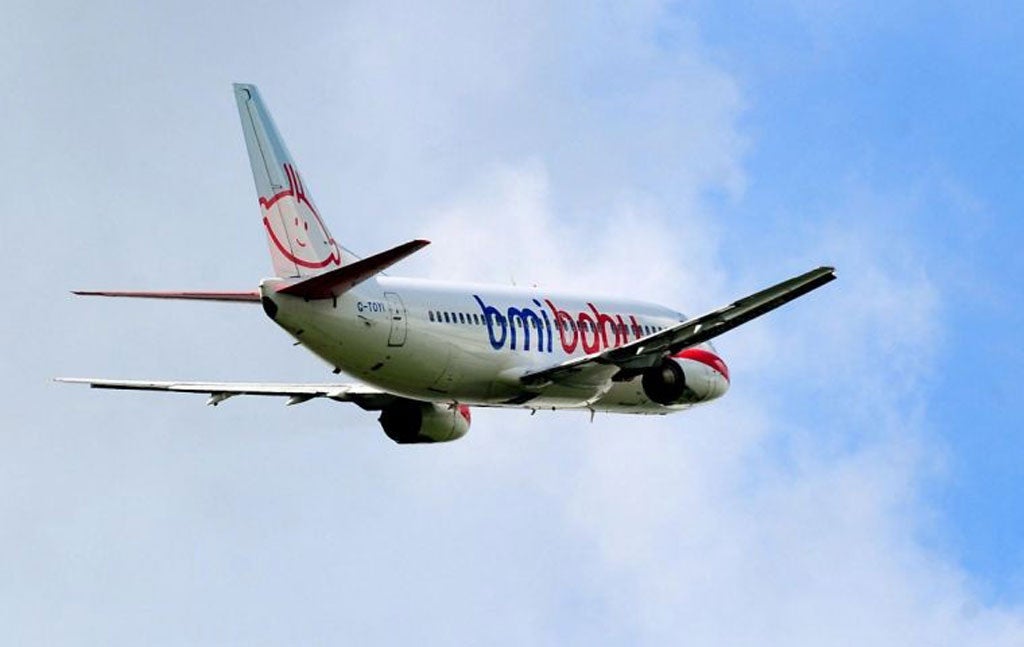Inside Travel: One-way flight to oblivion for Bmibaby
Once in the top three of Britain's budget airlines, Bmibaby is about to close down. Simon Calder waves goodbye...

Your support helps us to tell the story
From reproductive rights to climate change to Big Tech, The Independent is on the ground when the story is developing. Whether it's investigating the financials of Elon Musk's pro-Trump PAC or producing our latest documentary, 'The A Word', which shines a light on the American women fighting for reproductive rights, we know how important it is to parse out the facts from the messaging.
At such a critical moment in US history, we need reporters on the ground. Your donation allows us to keep sending journalists to speak to both sides of the story.
The Independent is trusted by Americans across the entire political spectrum. And unlike many other quality news outlets, we choose not to lock Americans out of our reporting and analysis with paywalls. We believe quality journalism should be available to everyone, paid for by those who can afford it.
Your support makes all the difference.Sunday 9 September is the last day in the short, sad life of Bmibaby. Since the no-frills airline was born a decade ago, millions have flown from its East Midlands base, as well as Birmingham, Belfast, Cardiff and Teesside. But the arrival of flight WW5330 from Malaga to East Midlands airport at 10.45pm marks the airline's final touchdown. An awful time for the 450 excellent staff who now face redundancy – and an event that signals less choice and higher fares.
A quick history lesson?
The roots of low-cost aviation in Europe go back to the early 1980s, when British Midland (as was) pioneered cut-price domestic flights from Heathrow. Its boss, Michael Bishop, built a profitable domestic and European network in competition with such flag carriers as British Airways and KLM. The benefits to travellers of "open skies" soon became clear. Bishop was knighted in 1991 (and is now Lord Glendonbrook). His groundwork enabled easyJet and Ryanair to flourish in the 1990s and take market share from British Midland – or BMI, as it had become. Then BA joined the fray with Go, its low-cost offshoot.
In March 2002 Go's chief executive, Barbara Cassani, revealed plans for a new base at East Midlands. BMI, which had ruled the roost for years, responded immediately to the encroachment. Within hours, the birth of Bmibaby was announced, with a route network serving domestic and European destinations, plus the Czech capital Prague –remarkably similar to Go's plans. BMI's director of corporate affairs, Tony Davis, was appointed chief executive of the new airline. "I'll always be grateful to Barbara Cassani for giving me the fastest promotion in airline history," he later told me.
Where did it all go right?
Bmibaby enjoyed a spell in the sun as Britain's third-largest low-cost airline, but from the start life was never easy. East Midlands became the location for a proxy war between BA and BMI. Travellers from East Midlands found themselves in the odd position of being able to reach Prague for next to nothing as a fares war intensified between the two airlines low-cost subsidiaries. Then easyJet took over Go, and Bmibaby found itself pitched against Britain's biggest low-cost airline. Expansion was constrained, with intense competition in London, and easyJet and Ryanair colonising the north of England and Scotland. Bmibaby settled on Cardiff, but later abandoned the Welsh capital – partly because of easyJet's thriving network from Bristol. Birmingham was more successful, though many questioned the wisdom of having two bases just 40 miles apart.
When did it all go wrong?
As long as the UK economy remained in good shape, BMI as a whole was profitable. Three years ago, though, the firm moved from profit to loss. Sir Michael Bishop had sold to Lufthansa, a reluctant buyer under an agreement signed in 1999 when times were good. The German airline became desperate to offload the heavily loss-making BMI.
Eventually BA bought BMI, but made clear it did not want Bmibaby. No buyer could be found. Routes from Belfast City were axed almost immediately, while some services from East Midlands and Birmingham were kept for the summer.
"It's been 10 fun-filled years," says the airline on its website, "but it's time to hang up our wings." Bmibaby follows Buzz, MyTravelLite and Thomsonfly into no-frills airline oblivion .
What will it mean for travellers?
Jet2 and Monarch have moved in to cherry-pick the most lucrative routes at East Midlands, and Flybe and Ryanair may expand. BMI Regional, now a separate company, will continue to serve Brussels and Frankfurt from East Midlands. But travellers may need to go further to fly – perhaps Birmingham, Luton or Doncaster. As with any diminution of competition, fares will rise. Yet anyone who has flown on Bmibaby recently should thank the shareholders of Lufthansa who subsidised each trip by an average of £10 per passenger.
What about claims against Bmibaby?
One reader asks: "I'm in dispute with Bmibaby about a flight earlier this summer. Does the airline simply disappear, leaving me helpless?" No. When British Airways took over BMI, and with it Bmibaby, it also took over the airline's liabilities. Your claim can take its normal course.
Join our commenting forum
Join thought-provoking conversations, follow other Independent readers and see their replies
Comments